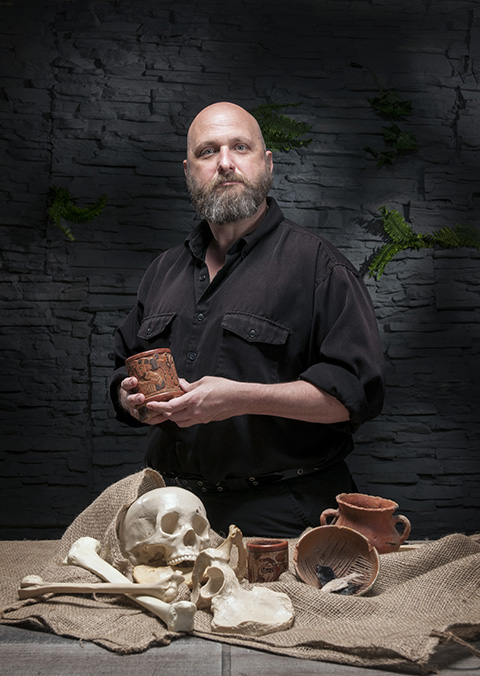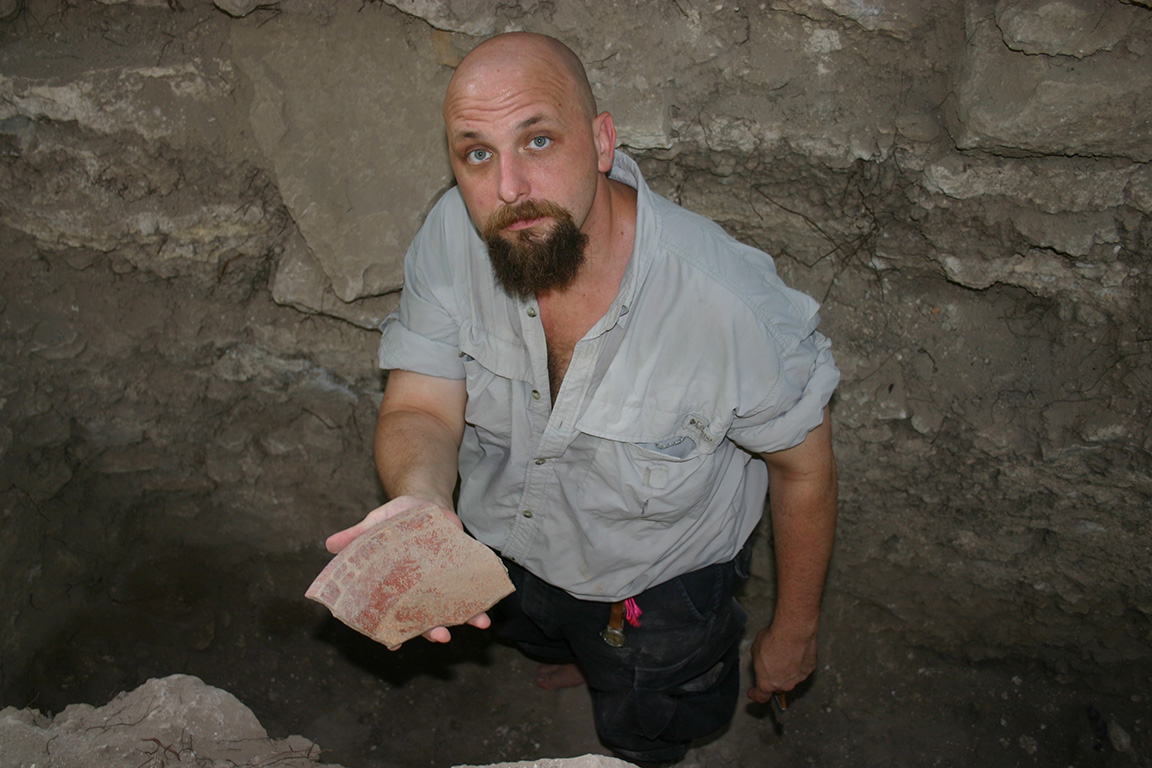Just outside the ancient city’s ruins, the verdant jungle canopy of Laguna del Tigre teems with life. Spider monkeys dart through the trees and colorful macaws can be heard in the distance. Jaguars are primarily nocturnal predators, but they are out there too along with crocodiles in the nearby rivers.
A more pressing concern are the insects, particularly the mosquitos. A well-known archeologist once said you’re not a real Guatemalan archeologist until you’ve had malaria, bot flies and dengue fever.
Welcome to one of Dr. Keith Eppich’s favorite spots in the world – El Perú-Waka’. Though it may seem inhospitable, the raw historical information buried a few feet under its soil draw him back every summer.
Rediscovered deep in the rainforests of Northern Guatemala by oil workers in the 1960s and opened up for archeological research in 2003, the site has offered deep insights into the history of the Maya.
Discoveries at the site made headlines in 2017 when archeologists uncovered the burial chamber of a 4th Century king, the oldest tomb unearthed at the site to this point.
A field archeologist and associate professor at Collin College, Dr. Eppich has spent every summer since 2003 at the site, sifting through layers of soil and “producing knowledge,” as he likes to consider his work. A former history major, the world of archeology appealed to him because archeologists get to the roots of historical discovery.
“You go to these ancient sites, these tombs, these residences and you come up with new things that people didn’t know before about the people who lived there,” Dr. Eppich said. “These are things that both enhance and supersede the historical documents that we have on these people and that they produced themselves.”
A fully literate people, the classic Maya wrote their own histories, but those histories were the genealogies of kings and gods. While illuminating, those accounts are only part of the picture.
 Dr. Eppich’s work has uncovered evidence of processional feasting, a ritualized activity
led by religious leaders in AD 600-800, after the fall of El Perú-Waka’s royalty.
He and his colleagues found evidence in the ruins that celebrants would dance along
a specific path “accompanied by musical instruments, pageantry, festivity and elaborate
costumes” as part of a ceremony that may have included the acquisition of a “wayob,”
an animal-spirit companion under the protections of their ancestors.
Dr. Eppich’s work has uncovered evidence of processional feasting, a ritualized activity
led by religious leaders in AD 600-800, after the fall of El Perú-Waka’s royalty.
He and his colleagues found evidence in the ruins that celebrants would dance along
a specific path “accompanied by musical instruments, pageantry, festivity and elaborate
costumes” as part of a ceremony that may have included the acquisition of a “wayob,”
an animal-spirit companion under the protections of their ancestors.
The discoveries bolster the “Last Palace” hypothesis, which suggests a plurality of religious authorities with no ties to the royal line ruled as an alternative to kingship, because none of the artifacts found bear the markings of royalty. The discoveries were significant and rivaled what Dr. Eppich thinks of as his team’s other great find at the site, a burial chamber unearthed in 2006. There he found the body with a mosaic jade death mask, which is now being reconstructed by a colleague at Washington University
Finds like the evidence of processional feasting at El Perú-Waka’ are providing new insight into the Maya people, a complex and fully Native American society which, without outside influence, developed same types of institutions as the Egyptians and early cultures in the Middle East.
“They both had currency, cities and kingdoms, and you see these parallels between economics and institutions that underscore who we are as a species,” Dr. Eppich said. “It suggests that real commonalities and real default settings exist for any type of complex human society. You can really only see that through archeology.”
Dr. Eppich brings that perspective and his field research to the classes in physical anthropology and archeology that he teaches at Collin College. By incorporating the latest research into his classroom, he believes he is fulfilling another vital tenet of archeology — the dissemination of knowledge.
“Teaching and research are kind of the same thing. It’s about the creation of knowledge,” he said. “As a scholar, as a professor, you have acquired this body of knowledge and you have to share it.
“A classroom is a celebration of knowledge. It is telling stories about the science of the human past, the science of humanity and of human culture, and everything about that is wonderful.”
It may seem hard to square Dr. Eppich’s role in a classroom with his work in the field, but his students appreciate the real-world insights into his subjects.
Samuel Canute, a first-year student at Collin, said he was never bored in Dr. Eppich’s class and is considering taking more archeology courses because of the experience.
“He was able to provide real life stories to correlate with what we were learning in class,” Canute said. “It was really cool to hear some of his excavation stories.”
Anthony Everett, a non-traditional student returning to college after retirement, said, “I find myself wishing that I were younger and able to entertain the idea of a career in anthropology or archeology.”
Both seemed taken with the romantic idea of archeology after Dr. Eppich’s classes. It’s easy to see why. The excitement he brings to a discussion about his digs is infectious.
Of course, that brings us back to mosquito-borne illnesses, of which Dr. Eppich has had two. You’ll have to ask him which ones, but the thought puts a damper on all but the heartiest of potential field researchers.
The work is important though. Information about ancient peoples isn’t just going to discover itself. So, Dr. Eppich is back in the jungle again as you read this, digging in the dirt, looking for the key to understanding long-dead civilizations.
His students, and the world of archeology, will be the better for it come this fall.

